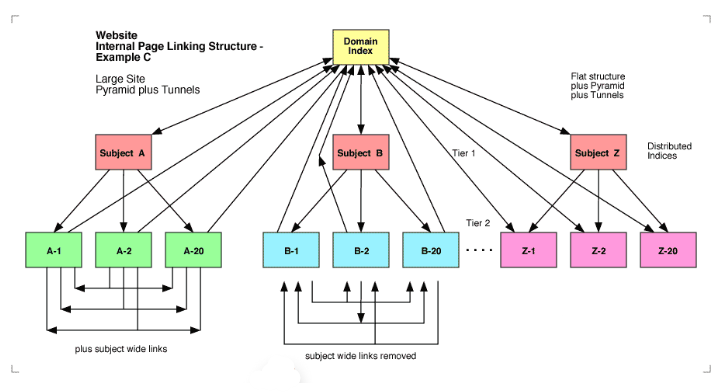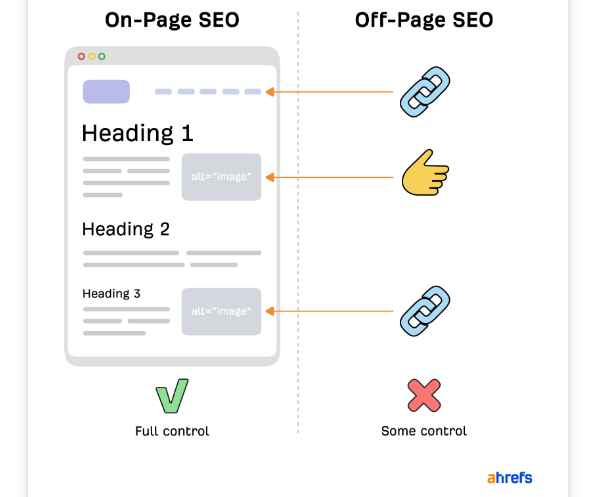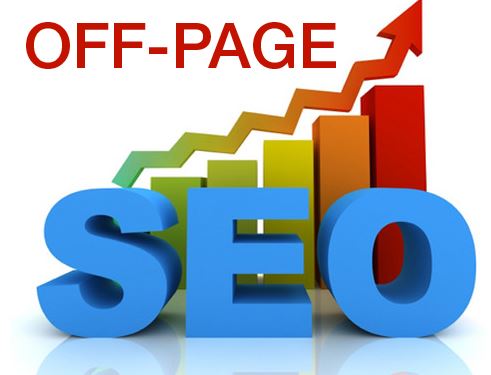Unofficially, off-page SEO is link building. And link building is a BIG deal.
But is that all there is to off-page SEO?
Beyond the golden opportunity of earning links, off-page SEO also builds sales. Your content will be exposed to decision-makers resulting in more sales opportunities.
Sweet, huh?
What other things should you know?
I’ve summarized everything you need to know about off-page SEO in this article. Watch out for the 5-point checklist towards the tail end.
Let’s dive in!
What Is Off-page SEO: How Does It Work?
I love Ahrefs’ definition:

However, don’t be deceived. Off-page SEO doesn’t start outside your website. From experience, it begins with it.
How so?
The success of your link building campaigns hinges on your thematic keyword. No one would link back to you if you don’t write around your audience’s needs and ACTUALLY provide value.
And when you do receive the backlinks [or inbound links], your site must be prepared to spread the link juice.
Create a structured link distribution silo from the high-traffic content [or receiving page] to your money pages and other parts of your site.

Source: Neil Patel
Otherwise, your efforts will have zero impact on Search Engine Optimization and sales.
So, what am I saying?
While off-page SEO may be off-site, it doesn’t act by its lonesome. It relies on your keyword research, internal link building, and content marketing & promotion.
And that brings us to the next phase:
The relationship/difference between off-page and on-page SEO.
Why Is Off-Page SEO Important?
Off-page SEO is a pivotal ranking factor, constituting the process of establishing your website’s reputation.
Websites possessing an exemplary reputation enjoy heightened prospects of securing better search engine rankings, as search engines perceive them as harboring heightened levels of expertise, authoritativeness, and trustworthiness, often abbreviated as E-A-T.
The off-page SEO factors encompass various elements, including backlinks, reviews, and recommendations, serving as potent indicators of E-A-T.
These factors, in essence, are vital constituents of your website’s ability to rank favorably.
This underscores the immense significance of off-page SEO in bolstering your webpage’s capacity to attain prominent search engine rankings.
In the realm of digital marketing and social media marketing, harnessing these off-page SEO factors, in conjunction with delivering great content, stands as a paramount strategy for optimizing your website’s presence, alongside optimizing your Google My Business profile.
Off-Page Vs. On-Page SEO
The names already pointed out the differences. Notwithstanding, I’ll spell it out to debunk some myths.
Let’s start with on-page SEO. It is not restricted to just the content part — content clarity, use of words, and engagement.
FYI, on-page SEO can also be technical. You’d think about the structure of the content — the h1, h2, call to value, and anchor text placement. Then, there is the optimization for search engines — keyword research.
Also, the design of the site and its responsiveness are crucial parts of on-page SEO. Without a smooth site experience, your content won’t convert regardless of quality.
Furthermore, on-page SEO includes internal link building. That’s how you know which page to link to and at what point.
How about off-page SEO?
Off-page SEO stands by the side — letting the on-page army do its stuff. Afterward, it projects that work to search engine bots.
The latter will provide links, while the former will show your content to your IDEAL audience.
In summary:
on-page and off-page SEO works together. While they have similar end goals, they fulfill different aspects.
And evidently, you have more control over the on-page than the off-page.

Should You Take Off-Page SEO Seriously?
Ever heard of Google’s E-A-T?
It’s one of the latest updates to Google’s algorithm. E-A-T [Expertise, Authoritative, & Trustworthiness].
The update means Google will prioritize pieces of content written by experts above all else on SERPs and search results.
How does that concern off-page SEO?
Off-page SEO influences the “A” part. Check out this excerpt from Google’s search quality evaluator guidelines:

In other words, link building [off-site SEO] influences authority. If you’re the go-to source for your niche, you’ll earn backlinks and brand mentions.
Now, back to the question.
Yes, off-page is a priority. Take it seriously. Below are some benefits your business [and site] will reap.
Increased DA/DR
While John Mu may frequently dismiss DA (Domain Authority) and DR (Domain Rating) scores as mere metrics from tools like Moz and Ahrefs, those in the field of SEO are well aware of their significance.
DA and DR metrics are rooted in the principles of Google’s now-defunct PageRank algorithm, serving as comprehensive indicators of a website’s backlink profile. Therefore, they hold substantial importance.
Furthermore, thorough research on my part has shed light on the matter. Upon scrutinizing the top-ranking pages across various keywords, a recurring pattern emerges: they consistently boast impressive DA/DR scores.
In essence, a clear correlation exists.
In simpler terms, off-page optimization plays a pivotal role in enhancing your website’s DA/DR score.
By employing effective strategies and delivering top-quality content, you can naturally attract backlinks from other websites.
These inbound links, laden with link juice, gradually bolster your website’s authority.
Consequently, your SEO efforts are rewarded with improved visibility in search engine results pages, underscoring the importance of producing high-quality content.
Related reading:
Enhanced Traffic
Increased DA/DR will lead to higher rankings in search results. And the higher your pages appear, the more chances there are of your site getting clicks [traffic].
But that’s not even the end of the tale.
Enhanced traffic is only a means to an end [conversion]. The more traffic, the more chances [at least 70%] for conversion and sales.
And guess what: Off-page SEO techniques are crucial to all of this.
The BEST part: off-page SEO ensures that there are several channels to get traffic. You could go through the usual guest blogging route.
Also, you try infographics or broken link building opportunities. Either way, your site will receive waves of traffic.
Recognition & Sales
Using Google’s words, “authority is when you’re the go-to source in your niche.” In other words, key actors recognize the value of your content.
And so?
- You will get brand mentions; you can follow that up for a backlink.
- You’ll be invited to podcasts and events: FREE window to build your following online and sell a low-ticket offer.
Bottom line: sales follow value!
When you churn out valuable content, you’ll naturally attract quality backlinks naturally. Ultimately, you’ll soon attract mentions on top sites and, in turn, bag partnerships and sponsorships.
However, remember that you will only reap these benefits when your off-page SEO strategies are tailored correctly.
So, how can you get it right?
Consider the factors below!
5 Factors To Consider When Doing Off-Page SEO
Link Type
Not all links will have the same juice to impact your site’s authority. Some won’t even add to you but reduce it.
How so?
Self-generated links like PBN backlinks won’t send any juice to your site. They might work for a while because the network is hidden.
However, the networks will soon be discovered. Then, the search engine will neglect all the backlinks.
Self-generated links [from black hat strategies] like hacking are borderline illegal. If discovered, you will receive a fine.
The worst case: your site will not only receive the tiniest drop of link juice. You could go AWOL on search results temporarily.
Bottom line:
Avoid self-generated links. Prioritize natural link building methods.
About natural link building, know this:
Focus on creating value and linkable assets. The links will come to you.
But if the process takes too long, you can boost your efforts with manual links.
Note:
Manual links are not self-generated. Unlike the latter, the former does not game search engine algorithms. Instead, it involves outreach and deliberately reaching out to bloggers for link building.
Examples of manual link building methods include guest blogging, sponsored posts, press releases, and broken link building.
My take: in my decade + years as an SEO, there are no 100% natural links. They are supported with manual actions like social shares and outreach.
Domain Authority
I probably sound like a broken record now talking about domain authority again. Well, that is because the metric is quintessential.
To understand the importance of domain authority, you need to know how link juice is distributed. Let’s paint a picture.
- Imagine that site A has a DA score of 95. It can send some of the juice to site B.
- Site B can re-distribute the juice received across its pages. By doing so, B’s DA will increase.
However, if the sources of your link have low DA scores, they will have little juice to pass on to you. And I wouldn’t recommend reaching out to sites with lower DAs than yours. Aim higher.
Why?
Read this in-depth guide on how link juice works to get closure.
Relevance
Even with the right backlink type from a high DA site, your website might not see any increase in rankings. If this is your case, check the relevancy of the link acquired.
- Is the source of the link an authority site in your niche?
- Or did you get backlinks from just any high DA site?
For example, getting links from high-DA casino sites as a pharmaceutical company makes zero sense. There is no correlation between the niche.
The worst case: search engine bots might even interpret the links as PBN backlinks and ignore the juice altogether.
My take: you’re better off with a link from a low-authority on a relevant site than one from unassociated sources with high authority.
Traffic
Even when a potential candidate meets all the SEO checklist criteria, it could still turn out to be an anomaly. From my experience, Private Blog Networks (PBNs) can present quite a challenge in the realm of organic search and off-page SEO tactics.
Did you know that some self-proclaimed “PBN gurus” acquire aged domains boasting high Domain Authorities (DAs), revamp them with finesse, and fill them with content relevant to specific niches?
In such instances, the telltale indicator becomes the volume of organic traffic. If a website’s metrics appear favorable but its organic traffic remains below the 1,000 monthly mark, it’s advisable to steer clear.
Such a website might indeed be a fluke.
But what if the organic traffic surpasses 1,000?
Don’t rush into action just yet. Examine the traffic projections in light of Google algorithm updates.
If the website consistently experiences a decline in traffic during these updates, it’s likely connected to a PBN, which can have adverse consequences for brand awareness and organic search rankings.
Link Placement
The last and most crucial factor (to consider) when doing off-page SEO is where and how your links are placed.
- Is your link placed as close to the start as possible or at the tail-end of the article?
- What is the performance of content?
- Is the content on a money or random page?
- What anchor was used?
- Did the anchor fit your keyword?
Bottom line:
It is not enough just getting links. Do it right. Stay close to the start of the content on the money pages.
More importantly, ensure the anchor fits your content marketing efforts.
On the technical side, check if the link is a “do-follow” or “no-follow.” The former ensures that your site receives equity from the backlink. The case is different for the latter.
Now, you know the basics of off-page SEO. What next?
I’ll show you how to start off-page SEO as a beginner.
Check out the steps below!
Doing Off-Page SEO As A Beginner In 5 Quick Steps
Get The Tools
Undoubtedly, you can use Google Search for virtually anything in SEO. However, it can be time-consuming.
Fortunately, there are free (and paid) tools that save time. Here are the top ones:
- Ahrefs
- HARO
- Semrush
- Moz
- Surfer
Keyword Research
Now, you have the tools. Start your off-page SEO from the bottom: keyword research.
What if you’re not a keyword research guru?
It’s okay. Watch your competitors. Let this guide help you.
If, after the guide, you still can’t get around keyword research, I can help. Reach out and get a FREE backlink audit and report.
Plan The Internal Linking
I’d recommend hiring an expert to lay out your internal pages. The process can be hectic and technical.
Nonetheless, you can test your hand.
While you are at it, follow these rules:
- List all your pages — homepage, service pages, categories, and supporting pages [content].
- Now, draw a map that connects the pages.
- Start from the bottom up with the supporting pages.
- The pages will connect to the homepage through category and service pages.
- Also, the supporting pages will link to each other.
Pro tip:
Collapse unnecessary pages that won’t fit into your plan. Or you can add them across your site.
Instead of a testimonial page, create a slideshow of your reviews across the footers.
On-page SEO
On-page SEO is more than just using Google to optimize your content. It also includes the structure and design of the posts.
More importantly, ensure your content is valuable.
The main post aside, check your meta description too. Ensure that it is also optimized for your money keyword.
Pick Your Strategies
Often, you might not wait until on-page SEO is done before picking your off-page strategies. For me, I include them in keyword research.
That way, I can tailor my content and research to the off-page SEO strategies I plan to use.
For example, let’s say I’m using broken link building. I can’t pick any random posts.
I must comb through my target site to see which of their links are broken. Then, I will create a replacement page and share it with the owners.
If I planned to write for other blogs as a strategy, I would only do it with their permission. My post won’t be approved if that happens.
Bottom line: while content marketing and distribution might be the last step, include it from the start.
Summary
While off-page SEO might seem like a stand-alone strategy for building links and authority, it is not. It works with on-page SEO. Together, they ensure your site gives value and expertise to prospects.
As a result, you’ll earn links, trust, brand mentions, and even sales. That is the end goal of off-page SEO.
FAQs About Off-Page SEO
What Tools Do You Use For Off-Page SEO?
While there are several tools for off-page SEO, I stick to my long-time favorites.
- Ahrefs — for competitor backlink analysis
- LinkedIn — for prospecting
- HARO — for manual press release links
- Slack — for project management
Is Off-page SEO Effective?
Short answer: yes!
Off-page SEO helps your site attract high-quality links. In turn, you’ll build trust, authority, and sales.
When planned as part of a well-designed campaign, off-page SEO will boost traffic and conversions.
What Are The Types Of Off-Page SEO Strategies?
While there are several off-page SEO strategies, the following is my go-to:
- Guest posting
- Broken link building
- Infographics link building
- HARO link building
- Local SEO – Google Business Profile, NAP citations
- Podcasts and events
- Social sharing

